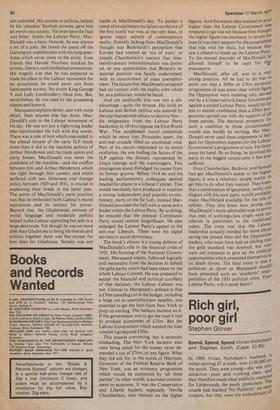Books and Records Wanted
3 vols. ARCHITECTURE of Sir E. Lutyans by ASG Butler and LIFE by C. HUSSEY. Rankin. 123 Marlborough Park South, Belfast 9.
IN ANOTHER COUNTRY by John Bayley. Write Spectator Box 722.
NO COLOURS OR CREST by Peter Kemp (Cassell 1968). Author wishes to obtain a copy. 24 Radnor Walk, London SW3. EUROPEAN HISTORY, Part Two Medieval and Early Modern Times. Webster. SMALL HOUSE AT ALLINGTON, Anthcrny Trollope. Write Spectator 736.
WILLIAM LAW, any works, other than his Serious Call. Write : C. Walter. Hanover House, Curry Rivet, Langport, Somerset.
THE HUGUENOTS IN THE SEVENTEENTH CENTURY by Charles Tyler, also The Ca misards,' a Sequel. Moore, 139 Hertford Road, Stevenage.
RUPERT BEAR ANNUALS Pre-1968 wanted in good condition. Write Spectator Box 737.
stable in MacDonald's day. To perfect a creed of evolutionary socialism on the eve of the first world war was, at the very least, to ignore major aspects of contemporary reality. Entirely lacking from MacDonald's thought Was Burkhardt's perception that Europe had entered an 'era of wars,' or Joseph Chamberlain's instinct that nineteenth-century internationalism was doomed, or any appreciation that Britain's industrial position was fatally undermined, with its concomitant of mass unemployment. The future that MacDonald projected had no contact with the reality with which he, as a politician, would be faced.
And yet politically this was not a disadvantage—quite the reverse. His hold on Labour and British politics was assured by the step that seemed certain to destroy him— his resignation from the Labour Party leadership in 1914 to oppose the First World War. This established moral credentials which he never lost. Principles apart, the anti-war crusade filled an emotional void. Part of his nature responded to its moral exaltation. He was leading the Saints of the ILP against the Sinners represented by Lloyd George and the warmongers. This courageous stand dislodged his career from its former groove. Before 1914 he and his leading parliamentary colleagues seemed headed for places in a Liberal Cabinet. This would inevitably have produced in reaction a strong independent, and possibly revolutionary, party of the far Left. Instead MacDonald provided the Left with a cause and a leader within the Labour Party. By so doing, he ensured that the postwar Communist Party would remain insignificant. He also enlarged the Labour Party's appeal to the anti-war Liberals. These were his signal services to social democracy.
The book's climax is a strong defence of MacDonald's role in the financial crisis of 1931. His forming of the National Government, Marquand argues, followed logically and inexorably from the decision to defend the gold parity which had been taken by the whole Labour Cabinet. He was prepared to accept the financial and political corollary of that decision; the Labour Cabinet was not. Central to Marquand's defence is that a £76m spending cut in the budget, including a large cut in unemployment benefits, was essential to get the loan from New York to prop up sterling. The bankers insisted on it. If the government was to get the loan it had to produce economies of £76m. But the Labour Government which wanted the loan wouldn't go beyond £56m.
This sounds convincing, but is seriously misleading. The New York bankers who were being asked for the money never demanded a cut of £76m, or any figure. What they did ask for, in the words of Harrison, Governor of the Federal Reserve Bank of New York, was an economy programme which would be supported by 'all three parties' ; in other words, a national commitment to economy. It was the Conservative and Liberal leaders, especially Neville Chamberlain, who insisted on the higher
figures. And the reason they insisted on a cut higher than the Labour Government was prepared to go was not because they thought the higher figure was necessary to secure the loan (it was their support for the programme that was vital for that), but because they saw a chance to break up the Labour Party. To the eternal discredit of MacDonald he allowed himself to be used for dip manoeuvre,
• MacDonald, after all, was in a very strong position. All he had to do was to point out that a £69m or £76m economY programme (it was never clear which figure the Opposition were insisting on), carried out by a Conservative-Liberal Government against a united Labour Party, would do far less to restore confidence than a £56m Programme carried out with the support of all three parties. The electoral prospects for such a coalition in those circumstances would also hardly be inviting. But MacDonald never used these arguments to bargain for Opposition support for the Labour Government's programme of cuts. He threw. away his hand. By so doing, he involved his party in the biggest catastrophe it has ever suffered. Once Chamberlain, Baldwin, and Samuel had got MacDonald's assent to the higher figure, it was a relatively simple matter to get him to do what they wanted. They knew that a combination of ignorance, vanity and disgust with his own party would probablY make MacDonald available for the role of splitter. They also knew how strong was MacDonald's more admirable urge to prove that men of working-class origin were not inferior in patriotism to the traditional rulers. The irony was that the Labour leadership actually' minded far more about saving the pound than did the Opposition leaders, who must have had an inkling that the gold standard was doomed, but .wht? were not prepared to give up the politica. opportunities which presented themselves in its death throes. The final irony is that a politician as clever as Marquand should have presented such an 'academic' interpretation of the 1931 political crisis. Poor Labour Party, will it never learn ?






































 Previous page
Previous page